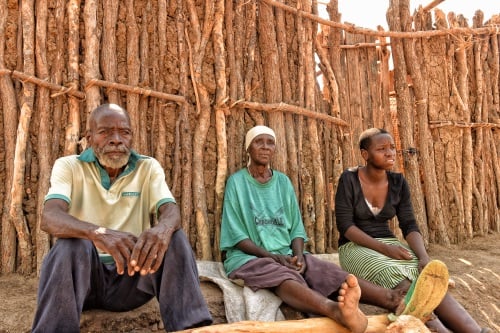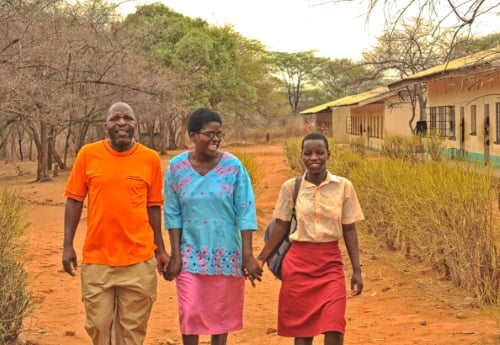MAHUWE, Zimbabwe – Life has not been easy for 15-year-old Shamiso Nyamutamba from the remote village of Mahuwe, Mbire, in north-eastern Zimbabwe. After losing both of her parents at the age of 5, she was left vulnerable to the advances of an abusive uncle and early child marriage to an older neighbour at the age of 13.
However, at the intervention of UNFPA's girls' empowerment programme, the Sista2Sista Club, Shamiso was spared of being married off early and now looks forward to a brighter future.
In rural Zimbabwe too many girls face entrenched discrimination and violence, abuses often underscored by deep poverty. Yet, armed with knowledge of her human rights, and with the support of other girls and women through the Sista2Sista Club, this extraordinary girl was able to break free.
The Sista2Sista Club has been implemented by partners supported by UNFPA, the United Nations Population Fund in Zimbabwe under the Integrated Support Programme, funded by the governments of Britain, Ireland and Sweden.
An uphill battle

When Shami’s parents died, both from HIV-related causes, her grandparents could not afford to care for her. An uncle from Harare, Zimbabwe’s capital, offered to bring her to the city and enrol her in school.
But when she arrived, he put her to work instead. She performed menial jobs for him, including physical labour. And worse, her uncle was often violent.
As she grew older, the abuse worsened. She recalls that one day, he told her, “l intend to go to bed with you.”
Shami reported him to an aunt, who took her away from Harare. This time, Shami went to live with her sister on a farm.
But her sister could not afford to send her to school, and an attempt to obtain an education grant for orphans was unsuccessful. Finally, her sister sent her back to their village in Mbire District to live with her grandparents.
But nor could they afford to send Shami to school full time. On the days she did attend, she would walk over 20 kilometres to school and back. Often, she was hungry and so she performed menial jobs in exchange for food.
Her grandparents hoped that marriage might change her situation.
In the traditional Shona practice of ‘kuzvarira’, poor girls are married off to men from more affluent families, often in exchange for food and other materials, or for a ‘bride price’ (lobola). In this tradition, a marriage was hastily arranged between Shami and an older neighbour.
A turning point
It was around that time that Shami learned about the Sista2Sista Club, a girls’ empowerment programme run through UNFPA’s Integrated Support Programme, funded by DFID, Irish Aid and SIDA.

Launched in September 2013, the Sista2Sista Club offers a safe place where vulnerable adolescent girls can speak with mentors and with each other about their problems. Girls in the club learn about sexual and reproductive health and rights, financial literacy, and how to navigate difficult social situations, including coercive relationships. The programme also aims to give girls the confidence and self-esteem to stand up for themselves.
Girls in the village encouraged Shami to attend a session at the Kodzero Sista2Sista Club (‘Kodzero’ means ‘our rights’), implemented by UNFPA partner Zimbabwe AIDS Prevention and Support Organization (ZAPSO).
“At first, Shamiso was very quiet and isolated. She kept to herself a lot and took a long time to open up to me and the group,” said Memory Makanjera, the club’s mentor and facilitator. “I told her it is okay to tell me any problems you are facing. Feel free to talk to me any time.”
After a few sessions Shami began to open up and finally, she told Memory about the impending marriage. Memory alerted Mereni Chakanetsa, the ZAPSO Programme Officer in Mbire, who immediately reported the matter to the police. At their intervention the marriage plans were quickly dissolved, and the man was reprimanded and warned to stay away from Shami and other young girls.
Shami, now the chairperson of the Kodzero Sista2Sista Club, encourages other girls to join so they can learn the same lessons she did. “Sista2Sista taught me that early marriage is wrong, and to report cases of abuse straight away,” she said.
She has also joined the Young People’s Network on SRH/HIV/AIDS, founded by the National AIDS Council (NAC) with support from UNFPA, and attends national meetings in Harare where she works with other passionate young people promoting SRHR in Zimbabwe.
A bright future

© UNFPA / Eric Gauss
The club encourages girls to get an education. With the intervention of the Sista2Sista programme and the assistance and generosity of ZAPSO and Ms. Chakanetsa, who invited Shami to stay with her in her family home so she could be close to school, Shami has been able to continue her education.
“When I met Shamiso I was really touched. I felt it was important for her to go to school and not sit at home all day, so I invited her to stay with us,” Ms. Chakanetsa said.
Shami was able to attend school full time and has proven to be academically gifted, and has won some academic awards.
Then, just as things were looking up for her, she fell ill. She started coughing and developed sores. Her Sista2Sista mentor, Memory, decided to take Shami for an HIV test. She tested positive.
“It turns out I was born with HIV but I did not know all this time,” said Shami. “What I am so grateful for is that when the family and the Sista2Sista Club found out my status, they accepted me and loved me like one of their family. I am taking medication and I am healthy. I can now look forward to my future.”
The programme has had an enormous impact. To date, 22,000 Zimbabwean girls have been enrolled and actively participated in the Sista2Sista Clubs. And many of them have committed to improving not only their own circumstances, but those of other girls as well.
Shami herself dreams of becoming a police officer. “I want to join the police so I can protect other young girls from being abused,” she said.
By Victoria Walshe



